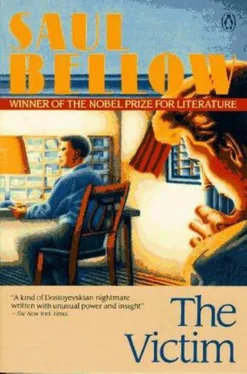Saul Bellow - The Victim
Здесь есть возможность читать онлайн «Saul Bellow - The Victim» весь текст электронной книги совершенно бесплатно (целиком полную версию без сокращений). В некоторых случаях можно слушать аудио, скачать через торрент в формате fb2 и присутствует краткое содержание. Год выпуска: 1988, Издательство: Penguin Books, Жанр: Современная проза, на английском языке. Описание произведения, (предисловие) а так же отзывы посетителей доступны на портале библиотеки ЛибКат.
- Название:The Victim
- Автор:
- Издательство:Penguin Books
- Жанр:
- Год:1988
- ISBN:нет данных
- Рейтинг книги:3 / 5. Голосов: 1
-
Избранное:Добавить в избранное
- Отзывы:
-
Ваша оценка:
- 60
- 1
- 2
- 3
- 4
- 5
The Victim: краткое содержание, описание и аннотация
Предлагаем к чтению аннотацию, описание, краткое содержание или предисловие (зависит от того, что написал сам автор книги «The Victim»). Если вы не нашли необходимую информацию о книге — напишите в комментариях, мы постараемся отыскать её.
The Victim — читать онлайн бесплатно полную книгу (весь текст) целиком
Ниже представлен текст книги, разбитый по страницам. Система сохранения места последней прочитанной страницы, позволяет с удобством читать онлайн бесплатно книгу «The Victim», без необходимости каждый раз заново искать на чём Вы остановились. Поставьте закладку, и сможете в любой момент перейти на страницу, на которой закончили чтение.
Интервал:
Закладка:
“He must have a definite object. If I could talk to him I might find out.”
“How would you get to talk to him? He doesn’t want you to know anything about him. He was mad when he found out I talked to you about him. But I’ll suggest it to him and see what happens.”
“I’ll expect to hear from you, then,” said Williston. “You won’t forget to call, will you?”
“I’ll call you,” Leventhal promised. He hung up and, setting the phone on some of his papers as a weight, he made an abstracted survey of his desk, slipped his jacket from the back of the chair, and started out to lunch.
He went down in the elevator amid a crowd of girls from the commercial school upstairs, largely unconscious of the pleasure that he took in their smooth arms and smooth faces. The elevator sank slowly in the musty shaft with a buzz of signals and a sparking of tiny arrowheads. On the street Leventhal bought a paper and glanced through it in the cafeteria. After lunch, he walked toward the river, passing through the sidewalk markets, between the sacks of coffee beans. The roasting odor was mixed with the smell of gas. The occasional piping of a tug or the low blurt of a steamer came through the trample and jamming of trucks, and booms bristled like the spikes of a maguey, dividing the white of the sky as the piers did that of the water.
He was the first to return to the office; the place was empty. A breeze passed over the papers on the desk or left rolled in the typewriters, and shadowed the green linen blinds on the crosspieces of the windows. He stepped out onto the fire escape to finish his cigar, and had just ground it out on the rail and tossed it into the air when one of the phones began to ring. In the violence of his turn, he struck his shoulder on the doorframe and for an instant he could not see — the interior of the office seemed black. The ringing filled the air wildly, coming from all four corners of the room simultaneously. He felt a clutch of horror at his heart, and the thrilling, piercing run of the bell was infinitely faster than the flow of his blood. He reached his desk. The call was for him.
“Yes? Who wants me?” he cried to the operator.
It was Villani.
Leventhal closed his eyes. It was what he had been expecting. Mickey was dead. He listened awhile to Villani and then roared out, “Where is my damned brother!”
“He came in last night,” said Villani. “He went straight out to the hospital. It was too late already. Poor little boy.”
Leventhal put the phone down. He could not restrain the play of muscles in his throat. He held himself off from the edge of the desk, as if about to stand up, and with the sick drop of fuller realization his broad face lost all color and his features grew thick.
After a time he picked up a pad and, printing Mr Beard’s name in large crayon strokes, wrote under it, “Death in the family” and, rising, went to lay it on his desk.
He walked with angry energy to the toilet and began to bathe his head. He had a crushing headache. Over the sink, when his face was wet, he began to cry. He snatched a paper towel from the box and covered his eyes. Then he heard someone approaching and turned blunderingly into a stall. He shut the door and, with his back against it, gradually, with silent effort, brought himself under control.
15
ON the ferry there was only a current of brackish air instead of the usual fresh breeze. The boat took the water with a sullen thudding beneath the broad lip of its bow. The air was chalky and the afternoon sun looked pale. One of the deck hands sat with his naked back touching the pilothouse, his head lying on his knees, his big forearms locked about his legs. At the slip, he dragged himself down the ladder to take down the chain, and Leventhal sprang past him and hurried through the shed. His bus was just pulling away from the curb, and he ran alongside and slammed at the door with his open hand. The bus stopped, the door folded open, and he squeezed in among the passengers on the lower step. The driver raised himself in his seat and called out something, stridently. His throat was taut and angry, his gray collar blackened with sweat. No one answered and, after a delay, he ground down the gearshift and they started again. Leventhal was panting. He did not heed the streaming of his face or the stinging of his hand. He was thinking, as he had thought on the boat, that he must expect to be blamed. Elena was bound to blame him and her mother sure to egg her on. He had argued for the hospital, he had brought the specialist; he had meddled. The old lady did not matter, but his dread of Elena was intense. Probably the disease was already in the fatal stage when Denisart took the case. In the hospital Mickey had at least had a chance, and if she had listened to the first doctor’s advice he might have been saved. So it was her fault, if anyone’s. But it was precisely because of the unreasonableness of the blame that he feared her. Nevertheless he was obliged to face her. He could not stay away now.
He hunted among the rows of bells, found his brother”s, rang, and climbed up. The door of the flat was open a few inches. He pushed it and was startled to feel a resisting weight on the inside. Letting the knob go, he retreated a step. It ran swiftly through his mind that it was not a child behind that door, not Philip. And why should Max try to keep him out? Could it be Elena? A hot wave of fright passed over him at the thought that the energy of madness had held back his push. “Who’s there?” he said hoarsely. “Who is it?” He went up to the door again. This time, merely at his touch, the door swung open. Elena’s mother was in the hallway. He understood at once what had happened. Standing at the hinge to see who was coming she had been caught against the wall in the narrow vestibule.
“What are you doing?” His tone was harsh.
She was silent, and he was baffled by her look; behind its vindictiveness there was something crazily resembling amusement.
“Where is everybody?”
“Go out. I alone,” she said in her rough voice. He had never before heard her speak English. It surprised him. As for the amusement, he must have been mistaken about that. It was the concentration of her look that had suggested it. The boy was, after all, her grandson.
“Where did they go?”
Either she did not know or was unable to explain. She uttered a few sounds. Steam was coming from the kitchen; he saw it behind her. Was she cooking dinner?
“Where are they, at the chapel? Is the funeral today?”
She merely shrugged; she refused to answer, and she gave him another of those frightful glances of spite and exultation, as though he were the devil.
“They’re going to come home to eat, aren’t they— mangare ? When?”
It was a waste of time. She only wanted to get rid of him. He turned from her and went downstairs.
No one responded to his knock at Villani’s. His headache was becoming severer. He frowned and hit at the door despairingly. Then it occurred to him to try the superintendent. He found him in the court, reading the paper in the shade of the furnace room stairs.
“Do you know where I can find my people?” he said. “I’m Max Leventhal’s brother.”
The superintendent got up. Old and slow, he rested his weight on bent, swollen knuckles.
“Why, the boy’s being buried out of Boldi’s parlors.”
“The old mother-in-law is upstairs, but she wouldn’t tell me. Where is this Boldi place?”
“Two blocks down. Turn left when you leave the building. Same side as this. There’s a church on the corner.” He bent to gather up the paper which had unfolded over his brown felt slippers.
The sun had come round to a clearer portion of the sky and its glare was overpowering. Leventhal took off his jacket. The heat of the pavement penetrated his soles and he felt it in the very bones of his feet. In a long, black peninsular yard a row of scratchy bushes grew, dead green. The walls were flaming coarsely, and each thing — the moping bushes, the face of a woman appearing at a screen, a heap of melons before a grocery — came to him as though raised to a new power and given another quality by the air; and the colors, granular and bloody, black, green, blue, quivered like gases over the steady baselines of shadow. The open door of the grocery was like the entrance to a cave or mine; the cans shone like embedded rocks. He had a momentary impression of being in a foreign city when he saw the church the superintendent had mentioned — the ponderousness, the gorgeous-ness, the decay of it, the fenced parish house, the garden, and the small fountain thick with white lead and flimsily curtained with water.
Читать дальшеИнтервал:
Закладка:
Похожие книги на «The Victim»
Представляем Вашему вниманию похожие книги на «The Victim» списком для выбора. Мы отобрали схожую по названию и смыслу литературу в надежде предоставить читателям больше вариантов отыскать новые, интересные, ещё непрочитанные произведения.
Обсуждение, отзывы о книге «The Victim» и просто собственные мнения читателей. Оставьте ваши комментарии, напишите, что Вы думаете о произведении, его смысле или главных героях. Укажите что конкретно понравилось, а что нет, и почему Вы так считаете.











